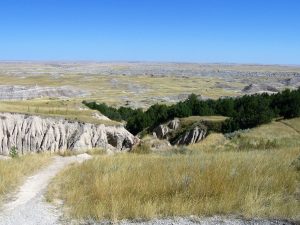Luke 18:35-43
As he approached Jericho, a blind man was sitting by the road begging. Hearing a crowd passing by, he inquired what was happening. “Jesus of Nazareth is passing by,” they told him. So he called out, “Jesus, Son of David, have mercy on me!” (CSB)
One summer we took a “presidential vacation” in Ohio, visiting various historical sites of Presidents McKinley, Hayes and Garfield. As we were concluding our visit at Garfield’s estate, a woman from the museum came up to us and asked if we would like to meet the great grandson of President Garfield. We were able to talk with him, and he autographed a book that I had purchased about his great grandfather. That was unusual, but then a day or so later as we visited my parents in Dover, Ohio, our then current president passed through Dover on his way to a meeting in Cambridge. My uncle and aunt went downtown with many others to see the President of the United States pass by. Yes, people are interested in meeting famous people or their relatives, even in the twenty-first century. So it should not surprise us that in the first century, a time with far less distractions, people eagerly thronged to see Jesus of Nazareth, the Great Prophet of God and worker of miracles. Let us consider what happened one day.
A blind beggar heard about Jesus approaching Jericho (18:35-38). Think about the sad condition of this man. Until we suffer, most people just coast through life, unaware of the challenges that other people face.
- He was blind. The tragedy of not being able to see is a great disability in any day. But in the first century, there were no forms of public assistance. In a dark world, the blind were totally dependent on other people.
- Most disabilities were accompanied by poverty, and here we see this man reduced to the task of begging. None of us can understand the degradation that this brought to the blind in that day.
- He was dependent on others for information about what was happening around him. Since we are created in God’s image, we want to know about the world he has made and what is happening in it. Clearly, this man had heard about Jesus, and had done a lot of talking and thinking about the identity and significance of Jesus.
Think about the drama of this situation. Jesus was on his way to Jericho and from there to Jerusalem to offer the final Passover sacrifice—the sacrifice of himself for sinners. Only twelve men besides Jesus knew what is going to happen; actually, Jesus told had told them, but though they knew, they didn’t understand. All that the crowds knew was that the amazing Teacher and worker of miracles named Jesus was passing through their town and they wanted to be part of the event.
The blind man, however, could not figure out what caused all the commotion. He could hear the noise of the crowds and he knew that it was not normal. So he used what resources that he had available. He asked, what is happening?
Now, we are not given any background information about what this blind beggar may have heard about Jesus. Obviously, he has heard some positive information about Jesus and what Jesus is able to do. But in his inner being, his thoughts about Jesus had generated some ideas, and he made a remarkable deduction: Jesus is the Son of David.
Dr. Luke has already taught us the underlying issues in this theology book that we call the Gospel of Luke. Think of Luke 4:17-21; 7:20-23; 9:18-20; 11:29-32. What the man did was reason through the acts of Jesus in the light of the interpretative framework of the Scriptures and then he came to the conclusion that Jesus must be the Messiah, God’s Anointed One, the Son of David. And if he is the Messiah, then he would able to help him out of his suffering. So he called out, “Jesus, Son of David, have mercy on me!”
What is your view of Jesus? That is a very significant question to have answered. Until you have true and adequate answers about his identity and significance, you will never depend on him for forgiveness and eternal life. Do you think that Jesus can help you out of your troubles?
Grace and peace, David

 And I heard a loud voice from the throne saying, “Look! God’s dwelling place is now among the people, and he will dwell with them. They will be his people, and God himself will be with them and be their God (Revelation 21:3).
And I heard a loud voice from the throne saying, “Look! God’s dwelling place is now among the people, and he will dwell with them. They will be his people, and God himself will be with them and be their God (Revelation 21:3). Ruth 1:14-15
Ruth 1:14-15 Hebrews 10:23
Hebrews 10:23